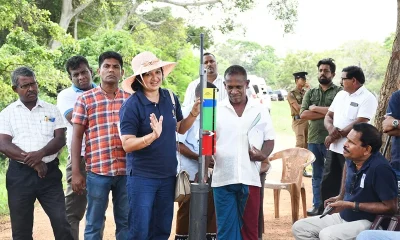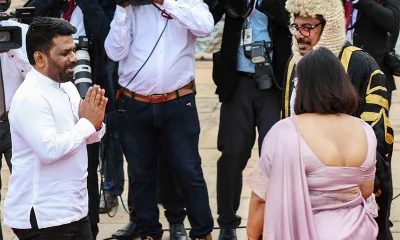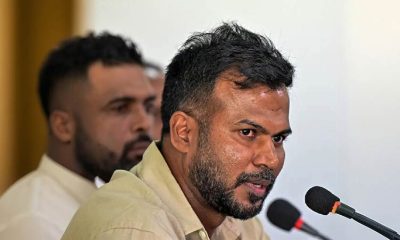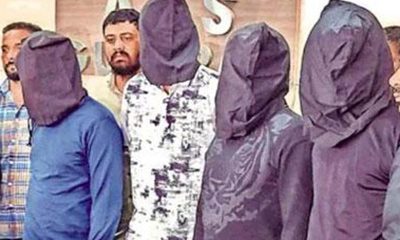Editorial
Bridging vaccine divide

Monday 12th April, 2021
Rich nations make a show of their commitment to defending human rights in the world. They harangue their developing counterparts, at every turn, about the need to protect human rights, and even threaten to meet non-compliance with punitive actions such as sanctions. They, however, do not seem keen to promote and protect humans’ right to vaccination vis-a-vis the prevailing global health emergency. The only way to safeguard this right is to ensure an equitable distribution of COVID-19 vaccines across the world, but the World Health Organisation (WHO) has expressed utter dismay at what it calls a ‘shocking imbalance’ in the distribution of vaccines between the rich and the poor.
This kind of vaccine inequality could be attributed to what WHO Director General Dr. Tedros Adhanom Ghebreyesus has rightly called a ‘catastrophic moral failure’. The COVAX initiative, which alone can ensure a well-coordinated global fight against the virus, has suffered a serious setback, with the high-income countries reportedly holding as many as 4.6 billion doses of vaccines, and the low-middle income nations only 670 million. One in four people have been inoculated in the high-income countries as opposed to one in more than 500 in the low-income countries, according to the WHO.
Unless the COVAX scheme, the most efficacious antidote to what has come to be dubbed ‘vaccine nationalism’, which has put the poorer countries at a distinct disadvantage, goes ahead as planned, a vast majority of the global population, in the developing countries, will be badly hit, and in the long-term, the world’s fight against the virus will be in jeopardy because the pandemic is no respecter of geographical boundaries; no country, however rich and powerful, will be safe in today’s interconnected world dependent on international trade and travel.
‘Vaccine nationalism’ may give the rich nations a sense of security in the short-term, but it will be counterproductive in the long-term, for no vaccine is believed to be able to ensure life-time immunity against COVID-19. The pandemic continues to throw up new challenges. Even if the rich nations achieve their vaccination goals while their poor counterparts are lagging far behind, they will be at the risk of being affected by new variants, against which, the currently available jabs might not be effective. This is why Dr. Ghebreyesus has said no country will be safe until every country is safe.
Some Asian nations are struggling to beat the virus despite some initial success in their battle against the pandemic, according to an Asia News Network article we publish today. The report informs us that India, which is grappling with its second wave of infections, has seen record increases of new cases, with more than 100,000 daily being reported on, at least, five days, last week. This being the predicament of a vaccine-producing nation, with a reasonably efficient vaccination rollout, the vulnerability of other countries is not difficult to guess. Similar unfortunate situations have been reported from other parts of the world as well. The US, which is among the nations with impressively high COVID-19 vaccination rates, is also troubled by a sudden increase in the number of pandemic-related deaths.
If the vaccine rollouts fail to reach a successful conclusion the world over fast, it may not be possible to achieve global herd immunity through vaccination, and the chances of beating the virus may be slim due to its mutations, experts warn. COVAX is scheduled to supply as many as two billion doses of vaccines to 190 countries within one year with 92 poorer nations gaining access to vaccines at the same time as their wealthier counterparts. This is a highly ambitious target, which, however, must be achieved if the world is to get on top of the pandemic. But help from the rich nations is not forthcoming, and it is only natural that the WHO is disappointed.
The WHO is hopeful that it may be possible to change the composition of the existing vaccines to deal with the mutations of the virus, but it is still trying to figure out what kind of impact new variants may have on the effectiveness of vaccines. Reuters reported yesterday that a new coronavirus variant discovered in South Africa had been found to be able to break through Pfizer/BitoNtech’s vaccine to a considerable extent. Some Indian epidemiologists interviewed by BBC yesterday said they feared that the emerging variants might even be able to escape the human immune system!
The need for all nations, which are currently at cross purposes as regards the global battle against the virus, to support and be guided by COVAX, which alone can make them work in unison to beat the virus, cannot be overemphasised.
Editorial
The games they play

The new parliament, packed with first timers as never before, had an interesting session last week with the dust yet unsettled over the issue of the last speaker’s doctorate. Now plain MP Ranwala who resigned from his august position, which ranked him number three in the national protocol list, has not admitted any malfeasance or skulduggery. He says his instant problem is an inability to quickly get clear proof of his qualification from Waseda, a private university in Japan with an affiliate research institutes, one of which he claims awarded him the disputed degree. This has been rubbished by critics saying we live in an age of instant communications. However that be, the ex-speaker is widely accused of flaunting a qualification he did not possess and the government which proposed him for the jb continues to draw flak on this matter. Whether his resignation was a command performance or voluntary remains unclear. After he gave up his wig and robes, there have even been demands that he resigns from parliament as he allegedly presented himself to the electorate with a qualification he did not possess.
Gone are the days when leftist giants of the past like Dr. NM Perera who earned a DSc. degree from the London University and Dr. Colvin, R. de Silva who earned a PhD from the same university strode the legislature and were recognized countrywide for their erudition. There was also the unforgettable W. Dahanayake from Galle, who succeeded the late SWRD Badaranaike as prime minister when the latter was assassinated. He called himself Dr. Wijayananda Dahanayake after he was conferred a doctorate honoris causa by the Vidyodaya University. He as Minister of Education, raised Vidyodaya and Vidyalankara from pirivena to university status and this was recognized by the conferring of the honorary degree.
Although some honorary doctorate holders use and have used the title, others desisted, restricting themselves to using it only in their curriculum vitae with the specific notation of honoris causa. We even had the notorious Mervyn Silva flaunting a so-called doctorate from the Institute of Alternative Medicine founded by the late Dr. Anton Jayasuriya who was a western qualified medical practitioner and a well know acupuncturist. His institute freely distribution of doctorates and all manner of persons were decorated with them.
There was a time in the past when a well know surgeon of yesteryear insisted that he be called Mr. Muller rather than Dr. Muller as he did not hold a Doctor of Medicine degree. In our country and many others holders of the MBBS (Bachelor of Medicine, Bachelor of Surgery) degree call themselves doctor although they hold no MD (Doctor of Medicine) qualification. In more recent years we have seen engineers, architects, attorneys-at-law and the like prefixing their names with Eng, Archt, Attorney-at-Law etc in front of their names obviously reacting to the Dr. prefix used by medical practitioners.. In fact, first time MP Dilith Jayaweera pertinently raised the question of why such appellations be used at all in Parliament. Why indeed? In fact many MPs commonly prefix their names with “Honorable,” a traditional nicety within the parliamentary chamber, quite needlessly and irrelevently outside that chamber. Cynics would say many of them are anything but honorable!
Apart from the Ranawala ruckus, the last week in parliament saw a lot of ha ho about titles used by various MPs. Justice Minister Harshana Nanayakkara accused SJB MP Ajith Perera of calling himself Adhinithigna (Advocate) though the two branches of the legal profession, Advocates and Proctors, were fused to into a single branch of Attorneys-at-Law in 1973 when Perera would have been all of five years old! This resulted in a lot of angry back and forth and hair splitting about the Sinhala word “counsel.” Nanayakkara said he was once a state counsel or Rajaye Adhinithigna. An old story about Namal Rajapaksa being helped through his final law exam was resurrected with Minister Wasantha Samarasinghe quoting a batch mate of Rajapaksa who made the original allegation and thereafter fled to Switzerland in fear of his life. This worthy, with whom the minister is in contact, apparently is willing to cooperate with any fresh inquiry. Rajapaksa said he would resign if the allegation is proved and challenged the accusor-minister to do likewise if it is not proven.
Opposition Leader Sajith Premadasa made a long explanation about his education beginning at the nursery stage at St. Bridget’s Convent, through St. Thomas’ Prep and Royal College. He admitted he had no GCE ‘OL’ from Sri Lanka as he had gone abroad and said he passed both the ‘O’ and ‘A’ Level exams in the UK. He had a degree from the London School of Economics and postgraduate qualifications from the US. Premadasa displayed a framed certificate in the chamber and said that he was tabling all documents for Hansard.
Apart from this, Health and Media Minister Nalinda Jayatissa read out a list of MPs who had benefited from the President’s Fund to pay medical bills and have since promised to make new revelations in the future. Former President Ranil Wickremesinghe, with nobody in parliament to speak on his behalf, had issued a press statement in this regard. The Daily Mirror on Friday headlined this report “None were given over Rs.1 million outside procedure except on one occasion: RW.” Wickremesinghe had indicated that there were may “personal requests” for assistance but did not expand.
The Fund set up by law in 1978 during the JR Jayewardene tenure was initially funded from donations and partly supported by the Development Lottery. There is very little information in the public domain on the subject but it has long been felt despite it being set up for the poor, many of the rich had benefited including progeny of the well-to-do sent to leading universities abroad at the fund’s expense. Given the current interest generated on this subject, it would be sensible to publish all disbursements and annual accounts as there is good reason to suspect that it is a means of patronage.
Editorial
Ranil’s advice

Saturday 21st December, 2024
Former President Ranil Wickremesinghe has urged the SJB-led Opposition to act responsibly and help ensure the continuity of the IMF bailout programme, which has enabled the economy to regain some stability. He has also thanked the NPP government for having kept the IMF programme on course.
Wickremesinghe’s exhortation to the Opposition and unsolicited advice to the government are timely but not devoid of politics. He is seeking the credit for what the country has achieved through the ongoing IMF programme, which got underway in earnest under his presidency. In fact, it is doubtful whether any other President would have had the courage to make a host of unpopular yet essential decisions to address the economic crisis. So, Wickremesinghe is not without a moral right to ask the government and the Opposition to act prudently and help the country make the most of the IMF programme. It is hoped that the Opposition and the government will heed Wickremesinghe’s advice and act accordingly.
Sadly, the SJB has chosen to play to the gallery, asking the government to renegotiate the IMF programme. It could not even sort out an internal dispute over its National List appointments, and one of its constituents resorted to legal action. So, how can such a political party claim to be able to make the IMF bend to its will? It is obviously trying to earn brownie points with the public by bellowing rhetoric.
The IMF programme is no economic panacea, but it will surely help Sri Lanka gain economic stability in the short-term. It has already yielded some tangible results. Much more remains to be done to ensure Sri Lanka’s long-term economic wellbeing, and it is up to the current dispensation as well as future governments to develop the economy and achieve debt sustainability.
Nobody likes IMF bailout conditions, which can be extremely harsh, but they are a prerequisite for a bankrupt country’s economic recovery. If Sri Lanka managed its economy properly, it would not have had to ask for IMF help, which comes with constricting conditions. However, what the IMF has prescribed is what Sri Lanka should have done on its own a long time ago.
When a country spends more than it earns and goes on borrowing recklessly from external sources to meet its revenue shortfall, it runs the risk of facing an economic crisis. The Mahinda Rajapaksa government indulged in wasteful expenditure; it spent a great deal of borrowed money on Ozymandian projects. The UNP-led Yahapalana government also borrowed heavily. The JVP backed that administration to the hilt. The Gotabaya Rajapaksa administration, in its wisdom, slashed taxes and tariffs, oblivious to the disastrous consequences of its harebrained action. The Covid -19 pandemic came, necessitating prolonged lockdowns, which took a heavy toll on the economy. The rest is history.
A person who falls into a well has to come out of its mouth, as a local saying goes. There is no other way out. Sri Lanka finds itself in a similar situation. Having ruined the economy, it found itself at the bottom of an economic pit. Thankfully, in answer to its pitiable pleas, the IMF threw a lifeline, which has enabled it to come halfway up. Needless to say, nothing will be stupider than for it to let go of that lifeline.
Editorial
Lest watchdogs should become lapdogs

Friday 20th December, 2024
The JVP-led NPP’s ascent to power rekindled the hopes of good governance activists for a radical break from the past and a new political culture. The incumbent government came under pressure to ensure the independence and integrity of the parliamentary Financial Committees by allowing them to be headed by Opposition MPs. But the efforts of the campaigners for good governance have been only partially successful. SJB MP Dr. Harsha de Silva has been appointed the Chairman of the Committee on Public Finance (COPF), and the government has said one of the NPP members should head the COPE (Committee on Public Finance).
The government’s position is that the COPE will conduct investigations into what happened under the previous administration and therefore an NPP MP should chair it. The Opposition’s efforts to persuade the government to change its mind have been in vain. President Anura Kumara Dissanayake himself reiterated the NPP’s position in Parliament on Wednesday in response to a request from Opposition Leader Sajith Premadasa that the government reconsider its decision.
The COPE plays a pivotal role in exposing irregularities in state enterprises and has the potential to restore public trust in Parliament. According to Standing Order No. 120, the duty of the COPE is to examine the accounts of public corporations, institutions funded wholly or in part by the state and of any business or other undertaking vested under any written law, with the assistance of the Auditor-General. One of the criticisms against the COPE is that its probes do not yield the desired results, and its reports gather dust. But there have been glaring exceptions.
The COPE under Dr. Wijeyadasa Rajapakshe’s chairmanship, during the Mahinda Rajapaksa government, played an activist role, paving the way for the reversal of a questionable divestiture programme—the privatisation of Sri Lanka Insurance Corporation and Lanka Marine Services. Similarly, the COPE under D. E. W. Gunasekara’s chairmanship was bold enough to produce a damning report on the first Treasury bond scam in 2015, but the UNP had Parliament dissolved, forestalling the submission of that vital document to the House. The COPE carried out its second probe into the Treasury bond scams under the chairmanship of the then Opposition MP Sunil Handunnetti. Thus, the COPE has proved its ability to safeguard the interests of the public, and the precedents it has set should be followed. Handunnetti, who is a powerful minister in the incumbent government, ought to lend his voice to those who are demanding that an Opposition MP be appointed as the COPE chairperson.
Situations could arise warranting investigations that adversely impact the interests of the incumbent government. If the COPE chairperson is a ruling party MP, he or she, under such circumstances, will not be able to act impartially owing to his or her party loyalty. This is why the campaigners for good governance insist that the parliamentary watchdog committees should be chaired by the Opposition.
The government’s argument that it has to appoint one of its MPs as the COPE chairperson because the irregularities to be probed occurred under the previous dispensation, whose MPs are currently in the opposition, is not tenable. The vast majority of the Opposition MPs in the current Parliament were not members of the previous administration, which became a metaphor for corruption, and therefore one of them can be appointed the COPE head.
The COPE will have to probe irregularities in state institutions during the current administration as well, and a ruling party MP functioning as its chairperson will be constrained to act in such a way that he or she is seen to be biased; the integrity of the watchdog committee will be compromised in such an eventuality.
One can only hope that the NPP will change its position and let an Opposition MP be appointed as COPE head.
-

 Opinion6 days ago
Opinion6 days agoDegree is not a title!
-

 News5 days ago
News5 days agoInnovative water management techniques revolutionising paddy cultivation in Lanka
-

 Features4 days ago
Features4 days agoThe Degree Circus
-

 Editorial6 days ago
Editorial6 days ago‘Compass’ under the microscope
-

 Sports2 days ago
Sports2 days agoSri Lanka to mend fences with veterans
-

 News6 days ago
News6 days agoArrest of Lankans on terrorism charges in Gujarat: Muslim grouping renews campaign for their release
-

 Opinion4 days ago
Opinion4 days agoHas ‘Compass’ lost direction?
-

 Editorial5 days ago
Editorial5 days agoA supreme irony











